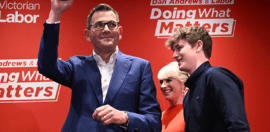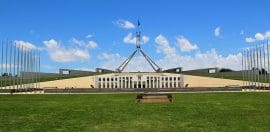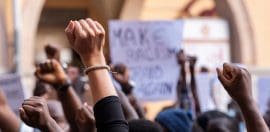Whatever happens in the US elections, the work ahead does not change

5 November 2020 at 8:35 am
It is time to think about the most effective thing that each of us can do next, according to our capacity, power and ability to leave the world a better place, writes David Ritter.
If there is one thing we know from the story of humanity’s response to the climate change emergency so far, it is that this is not a smooth thing. The big polluting vested interests have effectively frustrated what should have been a smooth incremental global transition. Instead, shocks and setbacks are epic. Some are human – the election of advocates for coal, oil and gas; others are in nature – when severe climate damage lands, and feedback loops are triggered.
Smoke and fire. Imponderable ballots. Wild animals immolated; political aspirations defeated. There is no ignoring the spectre of grief and disillusionment. The hand of tomorrow feels cold.
In The Fatal Days, an obscure Australian novel of the Second World War, author Henrietta Drake-Brockman describes one of her characters, living in rural Victoria, as becoming “bodily aware” of tectonic events happening whole continents away.
I’ve thought about that line a lot this week. For so many of us around the world, with no right or ability to participate in US politics but nonetheless caught within the penumbra of American power, the experience of the presidential election has been visceral. One colleague describes the dreams she’s had; another the physical shaking that they experienced as the count went on. The forces feel unfathomable and tectonic; the unthinkable arising from the abyss.
So what is our role in all of this? Rebecca Solnit’s collection of essays Hope in the Dark offers sober solace for our times. Appalling things have happened, are happening and will continue to happen; but the extraordinary and beautiful remain possible. As Solnit writes:
“The future is dark, with a darkness as much of the womb as the grave.”
Solnit exhorts us that the unknowability of the future is endless and a renewable source of hope. Elections come and go, but consequences are unpredictable. This is neither to deny hard political realities, or to evade the immensity of the full logic of the best science that we have; but to walk into the shadow with purpose; to find our way home. To do the next right thing. To do the biggest thing we can.
Some detachment is essential. None of us can single-handedly take on and solve the problems of the world. But all of us are capable of more than fatalism, or finding false comfort in the delusion that individual consumer choice is the most important thing for us to do.
We all have a role: a responsibility not to be ruled by our fears of the worst possibilities of the moment, but for each of us to consider our options for effective action.
In the Deloitte Climate Growth Report that came out earlier this week, economist Chris Richardson noted pithily that “everyone has a second job in life – the job of leaving the world a better place”. In the face of whatever comes, that is the work for everyone to do. And therein lies some consolation.
Rapid systems change may be driven at the level of the business, the school, the profession, the community, the city, the investment fund. Just last week, none other than Bunnings, Australia’s most trusted brand, declared a commitment to 100 per cent clean power by 2025.
The task for us all is to think through the greatest influence that we can personally have to shift the course of history through our institutions, and through all the domains of power and influence in which we operate; to contribute as greatly as we can to the systems change that is needed.
The agonies and exultations of history ebb and flow. However the US election results close out, the mission for peace, justice and the flourishing of life on earth goes on. It is time to think about the most effective thing that each of us can do next, according to our capacity, power and ability.
We have before us a lifetime of work; to secure an earth capable of nurturing life in all of its magnificent diversity. There is no other way forward than that labour of love, in all its varied forms, so best now to make the commitment; to be all in. There are alliances to be forged; vested interests to be challenged; money to be moved and reinvested; plans to be created; great things to be built; people to be cared for and a wounded planet to be nurtured. Everyone is needed. Human beings, working together, can achieve just about anything.
And as long as we live, life on earth is itself our ally; nature will resurge, given the chance to do so. Life fights for life.
And meanwhile, as I type this, I hear one of my daughters singing. A puppy yelps playfully across the laneway, as dogs have barked in Australia for thousands of years. There are some birds chirruping the beginning of a dusk that is immeasurably beautiful in an opaline sky.
Three things are true. The shocks are absolutely brutal and will continue. Life and love persist in the world. And there is urgent work to be done.







